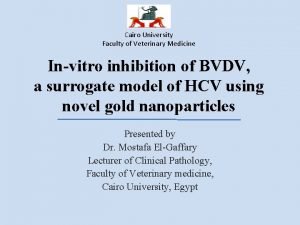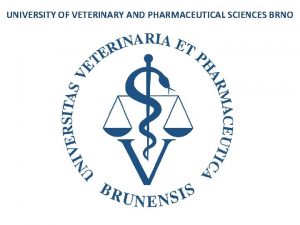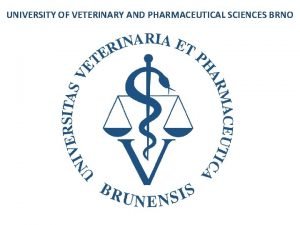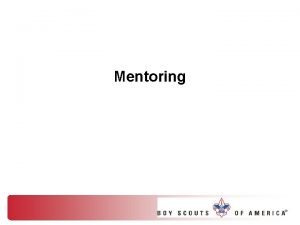Faculty mentoring in Department of Veterinary Clinical Sciences










- Slides: 10

Faculty mentoring in Department of Veterinary Clinical Sciences J. Catharine Scott-Moncrieff

Definition of faculty mentoring • Faculty mentoring is an important method of providing lifetime career guidance through which experienced faculty members share expertise, skills, perspectives, attitudes and proficiencies in order to help facilitate the scholarly and professional development of newer as well as more established faculty members. • VCS faculty mentoring document 2010

Department Veterinary Clinical Sciences Rank Number Tenure Track Clinical Track Assistant Professor 25 6 19 Associate Professor 14 9 5 Full Professor 16 13 3 Total 55 28 27

Mentoring policy • Formal mentoring policy adopted by VCS 2010 • 8 page document • Current working policy less formal than originally conceived • College of Veterinary Medicine adopted less detailed mentoring guidelines 2016

VCS Mentoring Policy specifics • All assistant professors choose a mentor(s) from the VCS faculty within 6 months of arrival • Prior to that home section faculty act as informal mentors • Highly encourage Associate Professors to also have a mentor • May be individual or team • Decision of suitable mentor in conjunction with department head • Department head initiates request with potential mentor • At least one of mentors must be from VCS department • Mentor must be from different discipline • Adding mentors to team from outside department encouraged

Faculty mentors • Full Professors tenure track or clinical track • Associate Professors tenure or clinical track • Usually only those who have been in rank at least 2 years • Tenure track faculty must have at least one TT mentor • Clinical track faculty may choose CT or TT mentor • No formal mentoring training for mentors • Informal peer discussion and training • Challenge to find enough senior mentors in VCS especially for CT

Duties of faculty mentor (VCS) • Mentor should meet regularly with mentee • • • Setting up meetings is responsibility of mentee Mentors will track down mentees and set up a meeting if this does not happen Sometimes department head requests that mentor schedule meeting No formal documentation of meeting currently required All aspects of career and work life balance within scope Typically focuses on research, teaching and clinical service • Mentor presents CV at P and T meeting • Meeting with mentee scheduled a few weeks prior to the P and T meeting • Reviews department head feedback to faculty member • Sometimes attends career development meetings • Assists with development of P and T promotion document

Potential roles of mentor (PVM mentoring document) • Provide guidance about conducting research and scholarship • Provide guidance about the promotion and tenure process • Provide guidance about publications. • Provide guidance about grant proposals. • Provide guidance about teaching • Serve as an advocate/sponsor • Provide help finding resources • Provide advice about service • Provide advice on navigating the Purdue systems • Provide advice on work-life issues • Help establish professional relationships • Help establish social relationships • Help develop a career plan and goals to advance that plan • Offer support and a be sounding board • Encourage direct and frequent mentor communication • Help with settling in to Purdue University

Important points regarding mentoring • Mentoring does not replace the mentee’s ultimate responsibility for their career development and success • Faculty mentoring does not replace the role of the department head as a mentor to each faculty member • Serving as a mentor is voluntary • Additional mentors may be added or dropped • Informal mentoring also important

Discussion questions regarding best practice • Should mentor and mentee be required to document meetings? • Should department facilitate meetings? • E. g. by providing lunch 1 -2 times a year? • Individual mentors versus mentoring team? • How to encourage Associate Professors to take advantage of mentoring? • Perhaps requires a different approach? • How to recognize contributions of senior faculty in the realm of mentoring? • How to encourage senior faculty to become mentors? • How to provide training for faculty mentors? Department/College/University • How to encourage faculty to ask for help from mentors?
 Faculty of veterinary medicine cairo university
Faculty of veterinary medicine cairo university Cairo university faculty of veterinary medicine
Cairo university faculty of veterinary medicine Faculty of veterinary medicine cairo university logo
Faculty of veterinary medicine cairo university logo دانشگاه دامپزشکی تهران
دانشگاه دامپزشکی تهران Brno veterinary university
Brno veterinary university Paten brno
Paten brno Veterinary waste management
Veterinary waste management Vet waste disposal
Vet waste disposal Faculty of organizational sciences
Faculty of organizational sciences University of kragujevac faculty of technical sciences
University of kragujevac faculty of technical sciences Faculty of medicine dentistry and health sciences
Faculty of medicine dentistry and health sciences



















